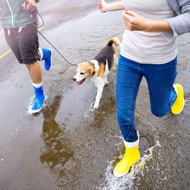
Health benefits should be recognised and facilitated, researchers say
Dog owners are four times more likely to complete the recommended level of physical activity per week than non dog owners, new research has confirmed.
It is recommended that adults do at least 150 minutes of moderate-to-vigorous exercise per week, but this is only achieved by 66 per cent of men and 58 per cent of women in England.
Whilst it is expected than dog ownership encourages physical activity, it has previously been unclear whether dog walking results in more physical activity, or simply replaces other forms of exercise.
According to a study by the University of Liverpool, published in Scientific Reports, 64 per cent of dog owners walk with their dogs for at least 150 minutes per week. Dog owners were found to walk more frequently and for longer periods than non dog owners. And this activity was carried out in addition to, not instead of other forms of physical activity.
Researchers studied the self-reported activity of 385 households in West Cheshire, comprising 191 dog owning adults, 455 non dog owning adults and 46 children.
Dr Carri Westgarth commented: “Our findings provide support for the role of pet dogs in promoting and maintaining positive health behaviours such as walking. Without dogs, it is likely that population physical activity levels would be much lower.
“The health benefits of dog ownership should be recognised and facilitated through the provision of dog-supportive walking environments and pet-friendly housing; failure of planning and policy makers to provide these may significantly damage population levels of physical activity.”



 The Greyhound Board of Great Britain has published new vaccination guidance, with all greyhounds registered from 1 January, 2027 required to have the L4 leptospirosis vaccination, rather than L2.
The Greyhound Board of Great Britain has published new vaccination guidance, with all greyhounds registered from 1 January, 2027 required to have the L4 leptospirosis vaccination, rather than L2.